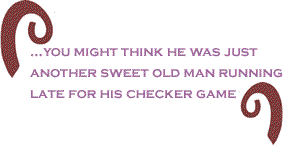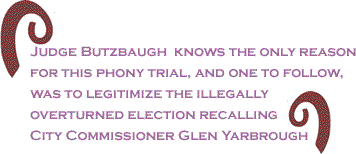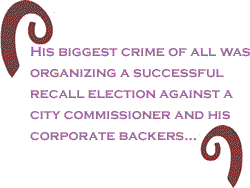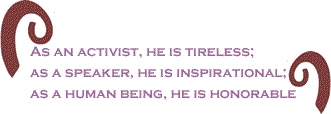
|
||||||||||||||||||||||
 |
||||||||||||||||||||||
 |
||||||||||||||||||||||
 |
||||||||||||||||||||||
 |
| The current issue is always free to everyone |
|
 |
 |
A friend tells me there is “no documented evidence”
of the KKK in The King in this scenario, Judge Alfred Butzbaugh, is probably not a bad fellow, as far as that goes. If you had seen him, as I have, wandering the halls of justice, wearing a lost look and a soft yellow sweater, you might think he was just another sweet old man running late for his checker game. He’s not that much more imposing in his courtly robes, and his manner in court is quiet and seemingly rational. But I’m afraid old Alfred is slaying the truth, not necessarily by what he says or does, but what he leaves out. He knows other things too, like there are already laws on the books to prevent tampering with mail, and that absentee ballot laws tend to discourage absentee voting and to target citizens who use absentee ballots in their election strategy. He knows there is no hard evidence against the Reverend; that the piles of phone records and absentee ballots mean nothing, and that differences in writing on applications is not illegal. He knows that the prosecution has no case beyond the conflicting testimony of questionable witnesses, with some witnesses’ stories even conflicting with their own testimony from an earlier, civil trial that was to result in the firing of that impeccable city clerk, Jean Nesbitt. But most of all, he knows the only reason for this phony trial, and one to follow, was to legitimize the illegally overturned election recalling City Commissioner Glen Yarbrough. And the election couldn’t be allowed to stand,
since point man Yarbrough would then be gone and the whole deal
would fall through: the Jack Nicklaus golf course, the fabulous
multi-million dollar resort and control of the water treatment
plant, all included in the sweetest land grab since There are other things that Judge Butzbaugh
is not telling, like the fact that he and his real estate company
likely stand to profit handsomely from the development that
Pinkney is fighting, Knaves typically get forgotten in history, and ours will probably fare no differently. His main role here is to be the second “K” in the title, and thus produce the clever reference to a national group of racist clowns. Gerald Vigansky is a young prosecutor, not yet practiced in the lawyerly art of looking at the defendant with disgust and maintaining an attitude of righteous indignation. His voice doesn’t carry much conviction as he stutters and stumbles over his arguments. He muddles along though, producing piles of phone records and piles of applications that were all filled out correctly, designed to bore the jury to stupefaction so that they failed to notice he had no case, and that his star witness was a crackhead. (Sorry, it’s true.) It’s amazing that he got ten out of twelve people to believe him at the trial I attended, and all twelve jurors on the second go-round. My gut feeling is that part of the reason he was able to obtain a conviction the second time is that Rev. Pinkney is African-American, and all twelve members of the jury were palefaces like me. But how do you prove something like that? Rev. Edward Pinkney, a Knight in every sense of the word, is my friend and personal hero. He calls me his “covenant brother”, and I’m completely, unabashedly proud of that. These days I feel like I’m never doing enough because my covenant brother is sitting in the Berrien County Jail in a cell with five other men, on a gym floor with just a blanket, or in “the hole”, depending on which story you believe. (I myself have not called the jail, even though I know the number. I’m sorry to tell you that, but I’m afraid of those kinds of places. Thinking of people in cages makes me feel like God has died.) Edward Pinkney, like most of us, doesn’t have
a perfect past. He says he got in a fight once when he was younger
and went to jail for it, even though there were two guys on
the other side. He also went to prison for a year and a half
over an insurance fraud case, but says that he was set up because
of his civil rights activities. He claims he was always a top
salesman with no need for tricks. With what I’m seeing in his
current case, I could easily believe that Some have called the Reverend a “provocateur” but, from what I gather, all that means is that he tells the truth loudly and often. My guess is the real reason Butzbaugh and Co. want him off the scene is because he has a remarkable way of exposing inequities.
What makes the Reverend’s fight even more courageous
is the Goliath he faces. Whirlpool Corp. is a pioneer in designing
new ways to rip people off. In 1999, according to the Multinational
Monitor, a jury levied a $581 million judgment against the
company for bilking unsuspecting poor people in Rev. Pinkney, being the man that he is, chooses
to fight these manipulations at whatever level he can. As an
activist, he is tireless; as a speaker, he is inspirational;
as a human being, he is honorable. He has mastered the art of
tough love in his dealings at the courthouse, and has a smile
and a joke for everyone. He knows people change slowly and institutions
even more so, but he is willing to put in the time to catch
others’ attention, and hopefully, make them think. He tolerates
the countless impositions on his time and health, including
intimidation by police, two lengthy trials, and now sitting
in jail. I believe the man would even give his life, if he thought
it would change some of the awful things going on in BlackCommentator.com Guest Commentator,
Phillip A. Bassett, is the former editor of the This commentary was originally published in BANCO, the Black Autonomy Network Community Organization. |
| February 21,
2008 Issue 265 |
|
| Executive Editor: Bill Fletcher, Jr. |
| Publisher: Peter Gamble |
| Printer Friendly Version in resizeable plain text format format |
 |
 |
 |
| |
| |






















 To
give an example, a company I’m with filmed the entire (first)
trial accusing Rev. Edward Pinkney of voter fraud in March of
2006, which ended in a hung jury. We filmed other hearings and
eventually ended up making a documentary. After one of the hearings,
Judge Butzbaugh called me up before him, as if I were a defendant
in the case, and told me my camera was no longer welcome in
the courtroom. The reason, he said, was that we had shown some
of the jurors in our documentary. Now technically, what the
judge said was correct. What he failed to say was that they
were shots of the backs of jurors’ heads, with virtually no
chance of identification. The judge had kicked me out on a technicality,
and I could only come up with one conclusion: He wanted my camera
out of there because I had just filmed some hours of testimony
detailing how
To
give an example, a company I’m with filmed the entire (first)
trial accusing Rev. Edward Pinkney of voter fraud in March of
2006, which ended in a hung jury. We filmed other hearings and
eventually ended up making a documentary. After one of the hearings,
Judge Butzbaugh called me up before him, as if I were a defendant
in the case, and told me my camera was no longer welcome in
the courtroom. The reason, he said, was that we had shown some
of the jurors in our documentary. Now technically, what the
judge said was correct. What he failed to say was that they
were shots of the backs of jurors’ heads, with virtually no
chance of identification. The judge had kicked me out on a technicality,
and I could only come up with one conclusion: He wanted my camera
out of there because I had just filmed some hours of testimony
detailing how 
 Pinkney
has other problems as well; he tends to get under the skin of
public officials. He has continually spoken out against the
seemingly constant corruption and police brutality in the city.
He organized picketers when Belinda Brown’s niece almost got
raped at gun point by that store owner, and led the march after
Terrence Shurn was run into a building on his motorcycle by
police. Perhaps most frustratingly, he has sat in on court hearings
on a daily basis, advising young men that they have rights and
that they don’t have to plead guilty just because the lawyers
tell them to. But his biggest crime of all was organizing a
successful recall election against a city commissioner and his
corporate backers which was handily overturned, a week or so
later, by the opinion of one Judge Paul Maloney.
Pinkney
has other problems as well; he tends to get under the skin of
public officials. He has continually spoken out against the
seemingly constant corruption and police brutality in the city.
He organized picketers when Belinda Brown’s niece almost got
raped at gun point by that store owner, and led the march after
Terrence Shurn was run into a building on his motorcycle by
police. Perhaps most frustratingly, he has sat in on court hearings
on a daily basis, advising young men that they have rights and
that they don’t have to plead guilty just because the lawyers
tell them to. But his biggest crime of all was organizing a
successful recall election against a city commissioner and his
corporate backers which was handily overturned, a week or so
later, by the opinion of one Judge Paul Maloney.
 As
it is, Pinkney and other residents remain heavily outgunned
and outmaneuvered by their corporate overlords. Other alliances
may be developing, though. One group in the
As
it is, Pinkney and other residents remain heavily outgunned
and outmaneuvered by their corporate overlords. Other alliances
may be developing, though. One group in the 




